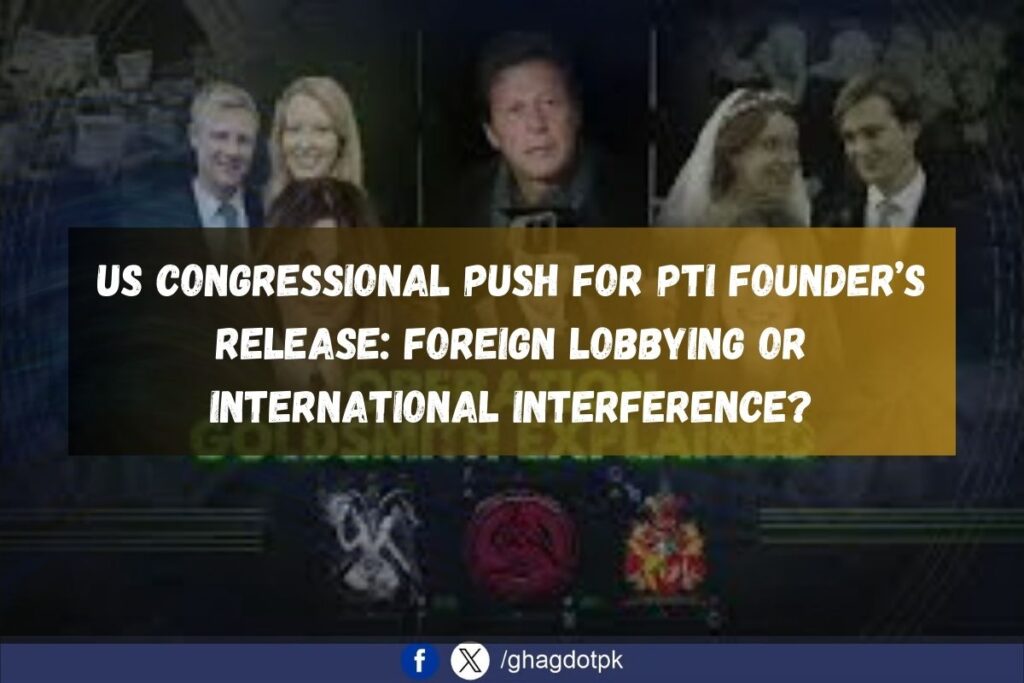Ghag Special Report: In an ongoing international political saga, 46 members of the US Congress, both Republicans and Democrats, have sent another letter to President Joe Biden, urging him to intervene in the release of the founder of Pakistan Tehreek-e-Insaf (PTI). This marks the second such appeal within a matter of months, following a similar letter signed by 60 Congress members. With more than 100 US legislators now demanding action for the PTI founder’s release, this unprecedented foreign involvement raises serious questions about sovereignty and the role of foreign lobbying in Pakistan’s domestic affairs.
Political analysts suggest that the PTI founder’s political agenda aligns with the interests of Zionist powers, particularly in terms of anti-state rhetoric and efforts to tarnish Pakistan’s image internationally. The PTI founder’s close ties with foreign lobbies, especially those advocating for stronger Israeli-Pakistani relations, have raised concerns about his role as a pawn in global power plays. However, critics argue that these foreign interventions conveniently ignore Israel’s atrocities in Palestine and the Kashmir conflict—issues that remain notably absent from the discussions of the US Congress members.
This new letter, which precedes a planned PTI protest on November 24, is seen as a direct continuation of what analysts describe as “Operation Goldsmith,” an effort by Zionist lobbies to breathe life into increasingly unpopular PTI rallies. These interventions are viewed as an attempt to regain traction in light of the party’s dwindling influence and lackluster public participation in recent protests.
On the diplomatic front, experts argue that such repeated appeals from US lawmakers are a clear violation of Pakistan’s sovereignty. By pressuring President Biden to intervene in the internal judicial matters of a foreign country, these actions cross the line of international diplomacy. Critics contend that the decision regarding the PTI founder’s fate should remain within Pakistan’s legal system, independent of foreign influence. They emphasize that the country’s courts are fully capable of addressing issues of corruption, terrorism, and incitement against the state, as outlined in the charges against the PTI founder.
Further complicating matters, allegations have surfaced regarding PTI’s extensive lobbying efforts abroad. Sources indicate that millions of dollars have been funneled into lobbying campaigns aimed at rallying international support for the PTI founder’s release. This is seen as part of a larger strategy to influence global public opinion and to apply pressure on Pakistani institutions. Analysts suggest that the PTI’s constant recourse to foreign lobbies not only undermines Pakistan’s sovereignty but also exposes the party’s broader ideological agenda.
Additionally, the letter from US Congress members has raised concerns about the role of Donald Bloom, the US Ambassador to Pakistan. Some lawmakers have expressed dissatisfaction with his response to human rights violations in Pakistan and the treatment of political prisoners. However, diplomatic experts defend Ambassador Bloom, stating that his efforts have been pivotal in strengthening US-Pakistan relations, and he is fully aware of the risks involved in meddling with a nation’s internal affairs.
Ultimately, experts believe that this second letter from US Congress members, much like the first, lacks any legal merit. The contents of the letter are seen as a one-sided narrative designed to exert undue pressure on Pakistan’s justice system. The continuous requests for foreign intervention are seen by political analysts as a direct contradiction to the PTI founder’s slogan of “We are not slaves,” signaling the hypocrisy behind these international appeals.
In conclusion, the latest developments underscore the complexities of international politics, lobbying, and the erosion of sovereignty. As Pakistan’s legal and political systems navigate these turbulent waters, the real question remains: should foreign powers dictate the fate of a political figure, or is it time for Pakistan to assert its independence and defend its judicial integrity?






